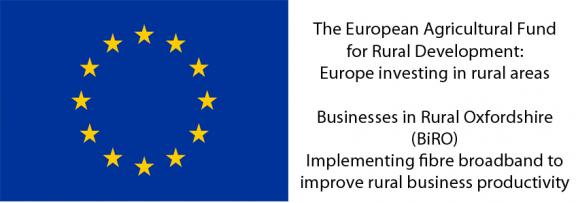Businesses in Rural Oxfordshire (BiRO)
In 2018 Oxfordshire County Council successfully applied for £6.3m of funding from The European Agricultural Fund for Rural Development (EAFRD), which contributes funds to the Rural Development Programme for England (RDPE). The funding aimed to connect as many rural businesses as possible to full-fibre broadband with the funding. Following an OJEU procurement in 2019, both BT and Airband were awarded contracts to collectively deliver full-fibre broadband to >750 businesses in the most rural parts of the county.
Delivery under these contracts started in October 2019 and completed in August 2022, with 777 businesses delivered and a further 818 residential properties also connected. Completed premises are shown on the coverage map as green dots with the annotation of Business or Residential “delivered by the BiRO Project - funded by EAFRD" in the premises pop-up, when you click on the green dot.

Oxfordshire’s Strategic Economic Plan (SEP) is the published ‘economic route map’ for Oxfordshire and focuses on supporting the economic performance, potential and prospects of Oxfordshire, and managing the county’s strong economic growth to ensure sustainability and inclusivity. Access to resilient and fast broadband for rural businesses was called out as a constraint to business growth and collaboration.
The ability for residents and businesses to have access to ultrafast and gigabit capable broadband connectivity is a central policy objective of both the county council and central government. Historically, the infrastructure providing connectivity has been based predominantly on cooper telephone wires that were installed over a century ago and are not fit for the huge increase in digital traffic today. Openreach is planning to switch off the existing copper wire telephony service from 2025 which means new fibre infrastructure needs to be built to over 30m homes across the UK. Whilst much of this work will be undertaken on a commercial basis, with Openreach, Virgin Media, and other operators upgrading their infrastructure in urban and semi-urban areas, Oxfordshire County Council is keen to ensure that rural and semi-rural areas are not left behind.
Another key rationale for the council’s support of this kind of intervention is the evidential means of securing economic growth and sustainability of employment whilst reducing the need for travel. This is a significant enabler for reduced carbon emissions as a tool for meeting our carbon-neutral targets.
